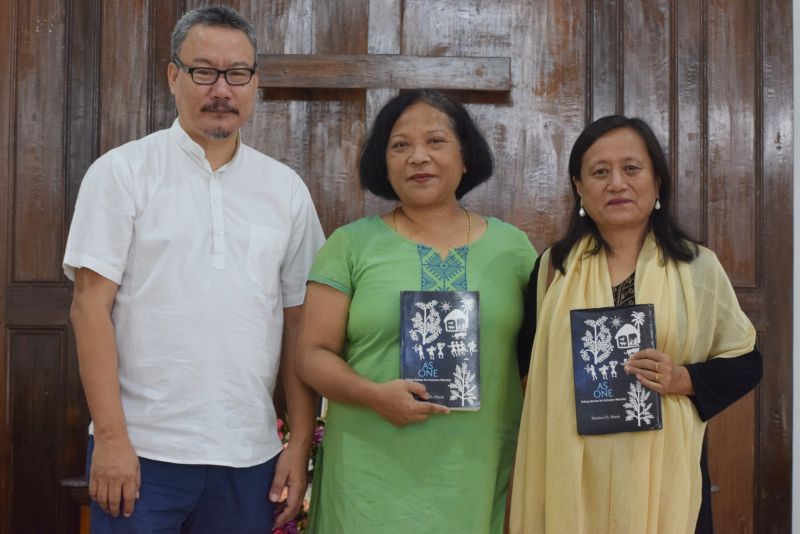1

From left to right: Rev. Dr Zhodi Angami, Rev. Dr Marlene Ch. and Rev. Dr L. M. Narola Imchen during the release of the book.
‘As One: Telling Stories for Inclusive Worship’ book released
Selie Visa
‘As One: Telling Stories for Inclusive Worship,’ a theological book written by Rev. Dr Marlene Ch. Marak was released by Rev. Dr LM Narola Imchen, Principal of Eastern Theological College, Jorhat, Assam, in Cook’s Chapel on September 11. While releasing the book, LM Narola Imchen said that the book is unique as it presents how women, and other marginalized groups, may use storytelling as a medium for inclusive worship. The book is written specifically from and for the context of tribal Baptist Christians in North East India.
About The Book
It is our stories that connect us to one another and enable us to become a community. When we tell our stories and listen to the stories of others, we break down the walls that separate us and we welcome each other in. When we come together to worship and share the stories of our life, our stories become God’s story. In fact, our personal and community stories are inseparable from sacred narrative. Worship is the telling of God’s story, but we ourselves are part of the very story we are telling.
In this book, Marlene Ch. Marak uses a method of “narrative communication” that integrates feminist perspective with aspects of narrative theory and Christian communication theory, to look at the significance of storytelling as a medium for evolving inclusive worship. The underlying premise of this book is that storytelling can be an ideological tool to challenge discrimination against women and girls. Marlene speaks specifically from and for the context of the tribal Baptist Christians in North East India. Churches in this part of the world are influenced by patriarchal traditions both from local cultures and inherited from early missionaries.
Symptoms of gender apartheid in worship are seen in the use of sexist language, discriminatory biblical theology, androcentric language about divinity, and sexist hymns and songs. The appropriate response to counter gender discrimination is the creation of inclusive community. The theological rationale for pushing the agenda of an inclusive community comes from God’s call to all to worship as equals, to share communion, and to live in m community. The cause of building inclusive community is also served by recovering the practice of the Lord’s Supper as a common meal shared by the community and reenvisioning baptism as initiation into a new reality where the old prejudices and distinctions have no meaning. How may women tell their stories in worship?
Marlene asserts that we have to overcome our storylessness by using the scripts of our lives as our sacred story. Our stories can be woven into our prayers, sermons, and rituals. We can also read the stories of the Bible as women and reimagine biblical narratives to challenge traditional perceptions. Our stories invite our hearers to experience our story, to view things from our perspective, so that we and our hearers are no longer strangers but in communion.
About The Author
Rev. Dr Marlene Ch. Marak, is a member of Tura Baptist Church and an ordained minister of the Garo Baptist Convention, Meghalaya. She earned her PhD in Christian Communication and Worship and Preaching from the University of Divinity, Melbourne, Australia. She is currently Associate Professor of Communication at Eastern Theological College, Jorhat, Assam. She is married to Rev. Dr Zhodi Angami, Associate Professor of New Testament and Greek, who also teaches at Eastern Theological College. They have a daughter, Mima Tejoé Marak, and they are guardians to a young girl, Rangkambe Ch. Marak.
The book is available for purchase online on several sites, including the publisher, Christian World Imprints (https://www.christianworldimprints.com)




